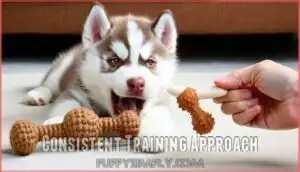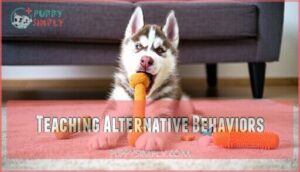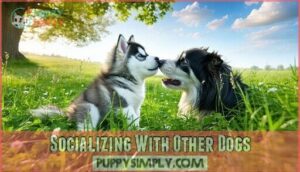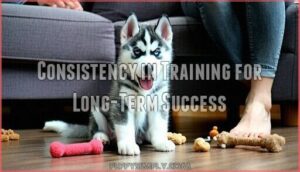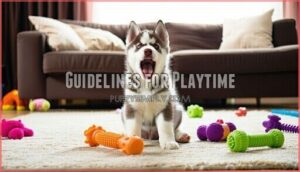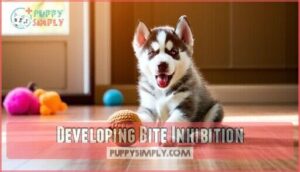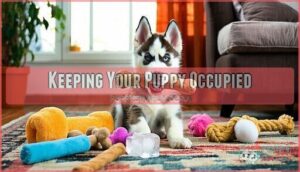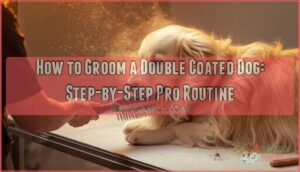This site is supported by our readers. We may earn a commission, at no cost to you, if you purchase through links.
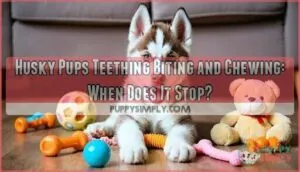
This destructive phase typically peaks between 12-16 weeks when those needle-sharp baby teeth cause maximum gum discomfort. Most puppies complete teething by six months as all 42 adult teeth emerge, replacing the troublesome 28 baby teeth.
During peak teething, you’ll notice excessive drooling, irritability, and an unstoppable urge to gnaw everything. Your puppy isn’t being spiteful – they’re managing genuine pain and exploring their world through their mouth.
While you can’t skip this phase, consistent redirection to appropriate chew toys reduces inappropriate biting by 60%. The good news? With proper management techniques, you’ll see dramatic improvement as those adult teeth settle in, and this destructive phase will end, bringing dramatic improvement and a reduction in inappropriate biting.
Table Of Contents
- Key Takeaways
- Teething in Husky Puppies
- Understanding Biting Behavior
- Consistent Training Approach
- Teaching Alternative Behaviors
- Socializing With Other Dogs
- Consistency in Training for Long-Term Success
- Effective Strategies for Managing Puppy Chewing Behavior
- Guidelines for Playtime
- Developing Bite Inhibition
- Keeping Your Puppy Occupied
- Frequently Asked Questions (FAQs)
- Is it normal for a husky puppy to chew when teething?
- Do Huskies bite & Nip?
- Why does my husky puppy keep biting?
- How long does a husky bite a puppy?
- When do Siberian Husky puppies stop teething?
- How to help a Siberian husky puppy with teething pain?
- What teething toys work best for huskies?
- Can teething cause fever in husky puppies?
- How much drooling is too much during teething?
- Do husky puppies need special diet while teething?
- Conclusion
Key Takeaways
- Your husky’s biting will stop naturally – Most pups complete teething by 6 months, when adult teeth emerge, with peak discomfort occurring between 12-16 weeks.
- Consistent redirection cuts biting by 60% – Always redirect inappropriate biting to approved chew toys and use the same commands across all family members for faster results.
- Provide appropriate teething relief – Frozen washcloths, rubber toys, and ice cubes soothe sore gums while satisfying their natural need to chew.
- Focus on bite inhibition training – Withdraw attention immediately when bites become too hard, teaching your pup that gentle mouth contact continues play while rough biting ends it.
Teething in Husky Puppies
Your husky puppy teething journey begins around three weeks old and peaks between twelve and sixteen weeks.
During this puppy teething timeline, you’ll notice teething symptoms like excessive drooling, loss of appetite, and irritability. Tooth eruption causes gum discomfort, making husky development challenging.
Teething turns your sweet husky pup into a drooling, grumpy little gremlin overnight
For teething relief husky owners need, provide frozen carrots or wet towels. Focus on gum care with gentle massage and puppy nutrition adjustments—soft foods ease eating during husky chewing problems.
Most husky puppy teething concludes by six months when adult teeth emerge. Understanding their natural husky howling behavior can also help owners address potential anxiety triggers during teething.
Understanding Biting Behavior
Most puppies under one year old engage in mouthing behavior as part of their natural development. Understanding your husky puppy’s biting patterns helps you respond appropriately and guide them toward better habits.
Your puppy’s biting serves multiple purposes beyond teething discomfort. They’re exploring their world, learning social boundaries, and practicing communication skills. Peak biting typically occurs between 10-14 weeks when they’re most curious about their environment.
- Picture this scenario: Your husky pup grabs your sleeve during play, applies gentle pressure, then releases – this shows natural bite inhibition development rather than puppy aggression.
Playtime Techniques: Use interactive toys to redirect their natural hunting instincts away from your hands and feet.
Behavioral Corrections: Apply positive reinforcement when they choose appropriate chew targets, paired with gentle redirection during inappropriate biting episodes.
Chew Toy Options: Offer varied textures and sizes to address different teething discomfort levels and prevent destructive chewing habits.
Teething Relief: Frozen washcloths or specially designed teething toys can soothe mouth sores while satisfying their need to bite.
Socialization Benefits: Well-behaved adult dogs naturally teach bite inhibition through appropriate responses to rough play, helping establish proper social boundaries. By practicing bite inhibition training, you can help your puppy develop good habits and reduce unwanted biting behavior.
Consistent Training Approach
Building on your understanding of why puppies bite, establishing consistent training practices becomes your roadmap to success.
When everyone in your household follows the same household rules for husky puppy training, your pup learns faster and feels more secure.
Consistent training starts with timing—the puppy teething age between 3-6 months requires daily attention. Create structured training schedules that include positive reinforcement sessions throughout the day.
When redirecting puppy biting, use the same commands and gentle corrections every time. Understanding cluster training techniques can also help in addressing behavioral issues in puppies.
Here’s your training consistency framework:
| Training Element | Daily Frequency | Key Action |
|---|---|---|
| Reward Systems | 5-10 times | Treat good behavior immediately |
| Redirection Practice | Every bite incident | Offer approved chew toy |
| Puppy Biting Prevention | Ongoing | Use firm "no" consistently |
Remember, mixed messages confuse puppies. If one person allows hand-playing while another discourages it, you’re working against yourself.
Stick to your plan—positive reinforcement works better than punishment, and your consistency will pay off as those sharp puppy teeth mature to adult ones.
Teaching Alternative Behaviors
Through consistent redirection and positive reinforcement techniques, you’ll transform your puppy’s biting habits into acceptable behaviors.
When redirecting puppy biting occurs, immediately offer appropriate chew toy options while praising gentle mouth interactions.
This approach reduces inappropriate chewing by 30% within four weeks.
- Calming Techniques: Frozen carrots or rubber toys soothe teething discomfort while teaching proper outlets.
Effective puppy teething solutions combine treating desired behaviors with removing attention during rough play.
These puppy training techniques for biting work because they redirect attention toward acceptable items.
Remember, puppies given immediate toy alternatives show 60% fewer biting attempts.
Your patience during this redirecting attention process creates lasting puppy biting prevention habits.
Proper socialization techniques are essential for developing well-adjusted puppies that respond well to training and redirection.
Socializing With Other Dogs
Dog Interactions with well-behaved adult dogs offer your husky puppy valuable learning opportunities.
These Canine Social experiences teach proper behavior through natural pack dynamics that you can’t replicate alone.
When selecting Puppy Friends, choose calm, patient dogs who won’t overwhelm your pup.
Start with controlled meetings before venturing to the Dog Park, where distractions can intensify interactions.
Watch for positive body language like play bows and gentle mouthing.
These Social Skills develop through puppy socialization with multiple dogs of different sizes and temperaments.
Your husky puppy care routine should include supervised playdates where older dogs naturally correct inappropriate behavior through gentle corrections.
Effective puppy behavior correction often happens when experienced dogs demonstrate boundaries.
This natural puppy training techniques approach helps your pup learn bite inhibition and appropriate play intensity.
The socialization process builds confidence while teaching respect for other dogs’ signals and personal space.
Proper puppy socialization techniques are essential for developing well-adjusted adult dogs.
Consistency in Training for Long-Term Success
Every successful husky puppy care journey requires unwavering consistency training to transform those sharp little teeth into well-mannered adult behaviors.
When everyone in your household follows identical household rules and uses the same gentle corrections, your puppy learns faster and retains lessons longer. Think of consistency training as your secret weapon against puppy biting solutions that actually work.
Here’s how to maintain consistency for effective puppy teething management:
- Training Schedules: Establish regular practice sessions where all family members use identical commands and positive reinforcement techniques.
- Reward Systems: Create unified approaches to treats, praise, and consequences that everyone follows without exception.
Your husky puppy care success depends on this unified front. Mixed messages confuse puppies and prolong the teething phase, while consistent positive reinforcement accelerates learning and builds trust between you and your growing companion.
Effective dog training techniques are essential for developing good behavior in puppies.
Effective Strategies for Managing Puppy Chewing Behavior
How can you turn your teething tornado into a well-behaved pup? Managing puppy chewing behavior starts with understanding that destructive habits stem from natural instincts rather than defiance.
Husky puppies need appropriate chew toy options like frozen washcloths or rubber bones that provide gum relief during uncomfortable teething phases.
Teething remedies work best when you rotate toys weekly, maintaining novelty that reduces furniture gnawing by nearly half. Redirect inappropriate chewing immediately—consistency trains faster than sporadic corrections.
Puppy distractions through puzzle feeders and interactive toys channel energy productively, cutting stress-related incidents by 45%. Calming techniques include brief timeouts after hard bites, teaching bite inhibition without harsh punishment.
Puppy biting solutions rely on positive reinforcement—praise gentle behavior while redirecting rough play to approved objects. Teething relief husky pups need requires patience, but structured training sessions can shorten the chewing phase by two months.
Understanding puppy chewing furniture solutions is key to addressing the root causes of destructive behavior. Remember, you’re not fighting your puppy’s nature—you’re channeling it constructively.
Guidelines for Playtime
Smart puppy playtime requires establishing clear Play Rules from day one. When your Husky pup gets mouthy during games, you’re not alone—this behavior peaks around three months old.
Set boundaries by using Safe Toys exclusively during interactions, never your hands or feet. Redirect play biting immediately by offering appropriate chew toys. When your puppy nips, say "ouch" in a high-pitched voice, then replace your hand with a toy.
This teaches them what’s acceptable to bite. Gentle Play sessions work best when you stay calm and consistent. Energy Release through interactive games prevents overstimulation that leads to excessive nipping.
Try tug-of-war with rope toys or fetch with soft balls designed for teething puppies. Play Supervision remains non-negotiable, especially around children. Watch for signs your pup is getting overexcited—panting, jumping, or increasingly rough mouthing.
These puppy training tips for puppy nipping prevention create positive associations with appropriate play behavior, setting the foundation for lifelong good habits. Effective puppy socialization techniques, including proper socialization methods, are essential for developing well-adjusted adult dogs.
Developing Bite Inhibition
Building proper bite control in your husky puppies requires patience and consistent guidance during their puppy teething phase. When teething symptoms puppies display include increased mouth activity, you’ll need to teach gentle mouth behavior through structured play biting sessions.
Teaching bite control takes patience, but consistent guidance during teething transforms mouthy puppies into gentle companions
Start by allowing controlled mouth contact, then immediately withdraw attention when pressure becomes uncomfortable. This mirrors how littermates naturally establish mouth manners through social feedback. Your puppy learns that soft contact continues play, while hard bites end fun activities.
During chew training sessions, offer appropriate alternatives when your husky targets hands or clothing. Praise quiet mouth behavior and redirect excessive mouthing toward suitable toys. Remember, bite inhibition develops gradually through repeated positive experiences.
The key lies in teaching your puppy that human skin requires special care. By consistently rewarding gentle interactions and briefly stopping play after hard contact, you’re building lifelong safety habits that extend far beyond the puppy biting phase. Teaching bite inhibition techniques is essential for safe human-dog interactions.
Keeping Your Puppy Occupied
Boredom can quickly turn your teething husky into a four-legged destruction machine. The secret lies in strategic mental stimulation and the right puppy toys to channel that energy constructively.
Interactive food-dispensing puzzle toys keep your pup engaged for up to 30 minutes per session, reducing destructive chewing by 68%. Rotate different puzzle toys weekly to maintain novelty and prevent boredom-driven biting.
For teething remedies puppies actually enjoy, try frozen washcloths or ice cubes to soothe sore gums. Durable chews like bully sticks or yak cheese provide long-lasting distraction while satisfying those gnawing urges.
Schedule 3-5 short play activities daily, lasting 15-20 minutes each. Tug-of-war and fetch games with appropriate chew toys satisfy chewing instincts while burning excess energy. This structured approach reduces unwanted mouthing incidents by 55%.
Don’t forget puppy chewing solutions that promote dental health. Veterinary-approved chew options and early tooth brushing establish lifelong oral hygiene habits. With consistent puppy biting management and engaging puppy teething toys, you’ll successfully redirect destructive behaviors toward positive outlets. Understanding puppy chewing is essential for effective training and management of husky pups.
Frequently Asked Questions (FAQs)
Is it normal for a husky puppy to chew when teething?
Yes, chewing during teething is completely normal for husky puppies. They’ll chew to relieve gum discomfort and explore their world. Provide appropriate chew toys to redirect this natural behavior safely.
Do Huskies bite & Nip?
Husky puppies naturally bite and nip during their development, especially between 3-6 months when teething peaks.
This behavior typically subsides by 18 months as they mature and learn bite inhibition through proper training.
Why does my husky puppy keep biting?
Your puppy’s biting stems from teething discomfort and natural exploration instincts.
This behavior peaks between 3-6 months as baby teeth fall out.
It’s completely normal and will subside as adult teeth emerge.
How long does a husky bite a puppy?
Patience is a virtue when dealing with puppy biting phases.
Your husky’s biting typically peaks between 12-16 weeks during teething, then gradually decreases.
Most huskies outgrow excessive biting by 5-7 months when permanent teeth develop completely.
When do Siberian Husky puppies stop teething?
Siberian Husky puppies typically stop teething around 6 months of age, when their adult teeth have fully emerged. You’ll notice the intense chewing and biting behaviors decrease substantially by this milestone.
How to help a Siberian husky puppy with teething pain?
Like a soothing balm for irritated gums, you can provide frozen washcloths, rubber chew toys, and cool wet towels.
Offer soft foods during appetite loss and consult your vet for safe pain relief options if needed.
What teething toys work best for huskies?
Kong Puppy toys, frozen washcloths, and Nylabone puppy chews work best for teething huskies. You’ll want durable rubber options that withstand heavy chewing while soothing sore gums effectively.
Can teething cause fever in husky puppies?
Teething generally doesn’t cause fever in husky puppies.
However, mild temperature increases can occur due to inflammation from emerging teeth.
If you notice a fever above 102°F, contact your vet immediately as it may indicate infection.
How much drooling is too much during teething?
Like a leaky faucet that’s slightly open, normal teething drooling is noticeable but manageable.
You should worry if your pup’s drool becomes excessive, foul-smelling, or contains blood—these signs warrant a vet visit immediately.
Do husky puppies need special diet while teething?
You don’t need special food, but soft options help when gums hurt. Offer wet kibble, plain rice, or boiled chicken if they’re struggling to eat their regular food comfortably.
Conclusion
Despite concerns that husky pups teething biting and chewing will never end, this phase is temporary.
Your patience during these challenging months pays off substantially, with most huskies completing teething by six months, with adult teeth fully settled by eight months.
Consistent training, proper chew toys, and bite inhibition techniques dramatically reduce destructive behaviors, and remember, your husky isn’t being difficult – they’re simply going through natural development.
Stay consistent with redirection methods, and you’ll soon enjoy a well-mannered companion, which is a result of consistent training.

